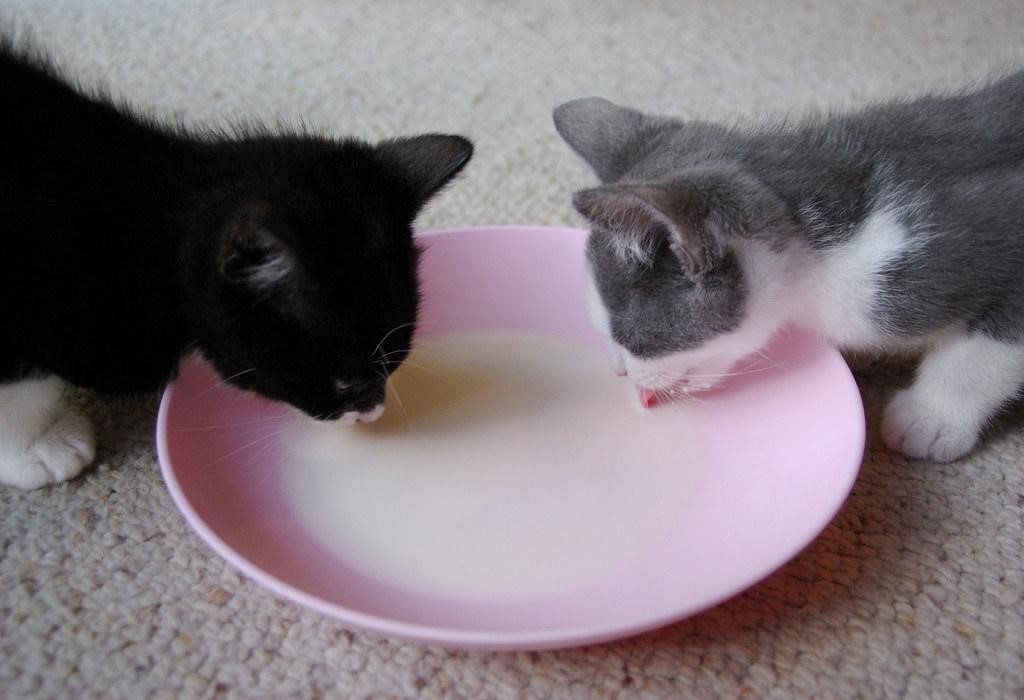Due to the various changes we are witnessing with our environment, it is substantial that many of us are looking for alternatives for living a healthier and wholesome lifestyle. Milk, for one, is a staple product found in every household. Irrespective of whether you stock up milk for your children, for yourself, or your pets, milk is one product common in every kitchen.
In recent years, we have seen a rising population of people who are beginning to opt for a vegan lifestyle, and with this wake, almond milk has been gaining growing popularity. To name a few of the benefits, almond milk is rich in vitamin D, it’s lactose-free, low in calories, and doesn’t increase your blood sugar level.
So, we can say that almond milk makes the perfect switch from cow’s milk.
Almond Milk
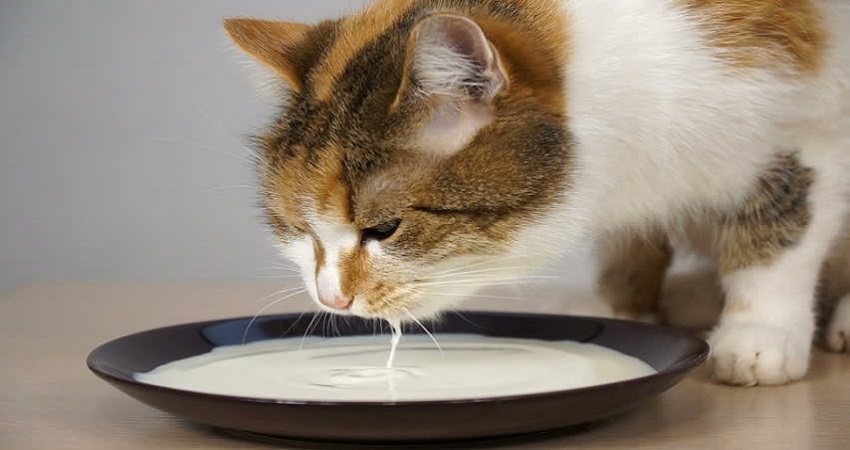
Almond milk is a popular choice these days as it is low in calories, and it is easily available in all your nearest convenience stores. Almond milk is one of the most favored substitutes for dairy milk, especially amongst people who are lactose intolerant. You can drink almond milk by adding honey, chocolate, or any flavor you like.
Since almond milk is nutritious for humans, you must be wondering if it is a good option to feed your cat as well. Aside from the usual cat food, you can also treat your cat with almond milk. You can feed almond milk to your cat but in moderation. Unlike dairy products, it does not contain any lactose, which most cats are intolerant of.
Benefits of Almond Milk
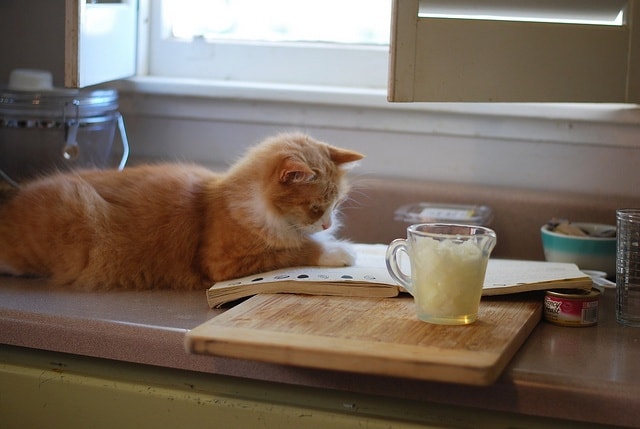
Apart from the taste, almond milk has certain health benefits for your cat. It contains low saturated fat and omega 3 fatty acids, which is good, especially if your cat suffers from cardiovascular problems. Almond milk is also rich in vitamin E, riboflavin, magnesium, selenium, potassium, and zinc.
Before you start feeding almond milk to your feline friend, make sure that it is not sensitive to any type of nuts, as it could lead to stomach issues.
How much is almond milk good for your cat?
Once you have figured out that almond milk is safe for your cat, you can start feeding it, but by measuring the quantity. You can initially begin in small quantities, let’s say about ¼ of a cup. Firstly, observe how your cat will react to the milk and then take it from there. However, that doesn’t necessarily mean that you will feed a bowl daily. Since cats are oblivious to the required amount it should take, as a pet owner, it is your responsibility to restrict and limit the amount.
Disadvantages of feeding almond milk to your cat
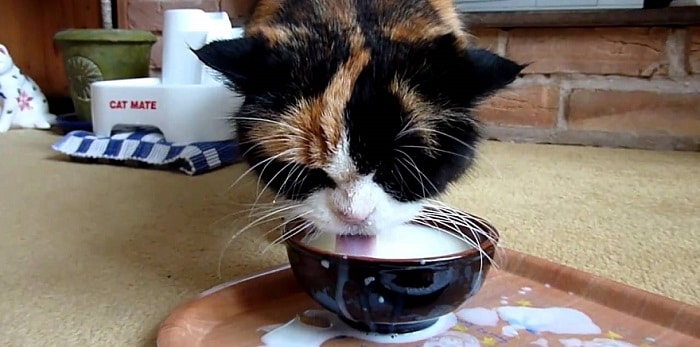
Almond milk contains sugar, which is not a healthy choice for your cat as it can cause obesity and dental problems. It also has bacteria that humans are capable of breaking down, but a cat cannot. Since almond milk is made of almond nuts, feeding them to your cat will heighten its sensitivity.
Although not life-threatening, almonds may cause health problems such as abdominal pain, diarrhea, and vomiting in cats. The refreshing, sweet, and creamy taste of almond milk is a treat. Seeing your cat devour a bowl might seem like a satisfying sight, but you should consider the risks attached as well.
Cats are born carnivores, and their natural diet mainly comprises proteins that derive from meat and meat-based products. The reason why cats are obligated to feed on animal protein is that felines cannot incorporate the amino acids which humans synthesize from plants.
Your cat has a digestive tract, which is very short, which goes to say that there isn’t enough time or room inside the cat for it to process the resources of the plant. Even though almonds provide a great protein source for humans, a cat’s digestive system isn’t equipped to extract nutrition in the same way.
This is the reason why, as a pet owner, you should feed animal-based products to your cats from where they will get the amino acids. Deficiency in amino acids can cause serious health issues to your cat.
A deficiency in amino acids can be problematic for the health of your cat, so it crucial that you feed animal-based food sources to it.
What type of milk can you feed your cat?
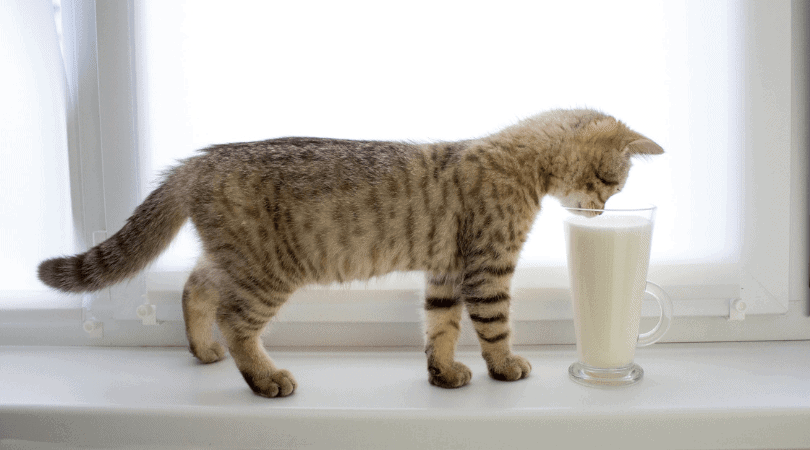
There are different types of milk, which are a good alternative to dairy products for humans, but these kinds of milk aren’t best suited for your cat. If you want to add milk to your cat’s diet, then you should buy those products which have been specifically made for cats. These products are specially developed to cater to the sensitive digestive system of cats.
These special kinds of milk will give your cat the required nutrition it needs for a balanced and healthy life. Milk aimed for cats is suitable for both kittens and adult cats; it is also beneficial for older cats who need the calorific intake to regain strength.
Kittens without mothers are still on a liquid diet as they cannot digest solid food. They require a whole set of special formulas to make up for nutrient needs. Thanks to the host of manufacturers, you can now feed kittens with specially formulated solutions that work wonderfully as replicates of breast milk.
Almond Milk as Small Treats
You can feed almond milk as treats to your cat. Even though your cat will get all the nutrients, it requires normal cat food. There is no harm in giving a bit of your delicious almond milk. A lot of cats can tolerate almond milk without issues so, a little treat every once in a while is harmless.
Whether it is almond milk or any other treat, be advised that you give it in measures amounts. Make sure that these yummy treats don’t lead to stomach problems, weight gain, or loss of interest in their normal diets.
While you are buying almond milk, see that you opt for one of high quality. Restrain from buying the kind of milk that has been artificially sweetened or flavored as this type of product will do more harm to your cat’s health.
